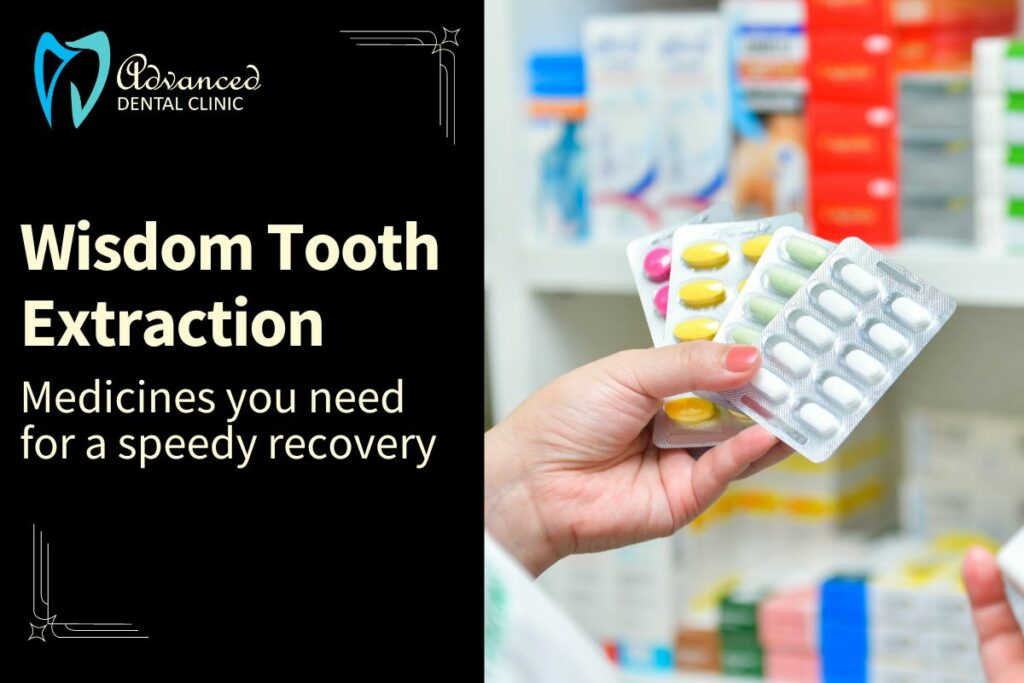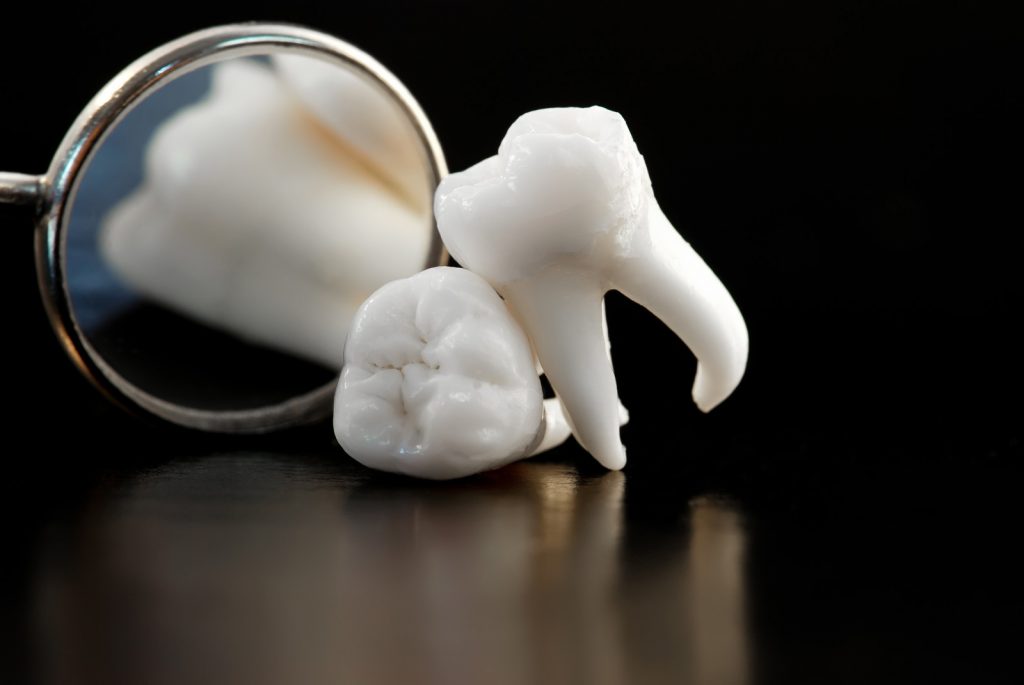Antibiotics after wisdom tooth extraction are typically prescribed if an infection is present or at high risk. Your dentist will advise on the proper timing for their use.
Navigating the recovery process after wisdom tooth removal can be daunting. Ensuring a smooth and infection-free healing period is a top priority. Wisdom teeth extractions are common dental procedures, but complications can arise without proper aftercare. Antibiotics play a crucial role in preventing postoperative infections, especially for patients susceptible to complications or those who had a pre-existing infection.
The timing and necessity of antibiotic usage vary from case to case. Dentists assess individual risk factors, such as medical history and the complexity of the extraction, to determine the need for antibiotics. Taking them as prescribed can help fend off harmful bacteria and safeguard your oral health. Always follow your dentist’s guidance and complete the prescribed course if antibiotics are given.
Importance Of Post-extraction Care
Wisdom tooth extraction is a significant dental procedure. Proper care post-surgery is crucial. It helps prevent complications. It also ensures smooth and swift healing. Knowing when to take antibiotics is part of this care. Let’s explore the importance of post-extraction care.
Risk Of Infection
After wisdom tooth removal, the risk of infection is real. The open wound is vulnerable to bacteria. Dentists often prescribe antibiotics to fight this risk. Patients should follow the prescribed course. This minimizes the chance of infection. It’s vital to take the full course, even if you feel better. Stopping early can lead to resistant bacteria.
Healing Process Acceleration
Antibiotics can speed up healing. They do this by keeping the extraction site free from infection. A clean wound heals faster. This means less pain and a quicker return to daily activities. Always take medication as directed. Never self-medicate. Your dentist knows the best post-care routine for you.
- Always follow your dentist’s instructions.
- Take the full antibiotic course prescribed.
- Keep the wound clean and dry.
- Avoid smoking and using straws.
- Report any signs of infection immediately.

Credit: www.jacksonavedental.com
Wisdom Tooth Extraction Basics
Wisdom Tooth Extraction Basics cover essential steps. It involves removing a wisdom tooth. This tooth can cause pain and other dental issues. Understanding the procedure and what to expect helps in recovery.
Procedure Overview
The process starts with a dentist check. They use X-rays to look at the tooth. The goal is to see how the tooth lies. This helps plan the extraction.
Before starting, the dentist will use anesthesia. This makes sure you feel no pain. They then remove the tooth. Sometimes they cut the gum to get the tooth out.
After removal, they clean the area. They might stitch the gum. A gauze piece goes over the spot to stop bleeding.
Common Post-operative Symptoms
- Pain at the extraction site.
- Swelling around the cheek and jaw.
- Minor bleeding for a few hours.
- Difficulty in opening the mouth fully.
These symptoms are normal. They usually improve in a few days. Using ice packs can reduce swelling. Pain relief medication helps with discomfort.
Antibiotics Role In Dental Procedures
Antibiotics play a crucial role in dental health. They fight bacteria. They prevent infections after procedures like wisdom tooth extraction.
Preventing Infections
Prevention is key after dental surgery. Antibiotics help here. They reduce the risk of complications. Dentists often prescribe them to keep the surgery site free from infection.
- Protect wound area
- Stop bacteria growth
- Ensure smooth recovery
Types Of Antibiotics Prescribed
Different antibiotics serve different purposes. Your dentist will choose one based on your needs.
| Antibiotic | Use Case |
|---|---|
| Amoxicillin | Common choice for oral infections |
| Clindamycin | For patients allergic to penicillin |
| Metronidazole | Used alongside other antibiotics |

Credit: theadvancedental.com
Assessing The Need For Antibiotics
Assessing the Need for Antibiotics post wisdom tooth extraction is crucial. It helps prevent infections. Not everyone will need them. The decision is based on several factors.
Individual Risk Factors
Each patient’s health profile is unique. Some may have higher risks for infection. Factors include:
- Medical history
- Immune system strength
- Presence of bacteria in the mouth
Patients with certain conditions may need antibiotics. These conditions include:
| Condition | Antibiotics Need |
|---|---|
| Diabetes | Higher |
| Heart issues | Higher |
| Previous infections | Higher |
Dentist’s Recommendations
Your dentist knows best. They consider individual risks. They look at surgery complexity. They might suggest antibiotics if:
- The surgery was long
- Multiple teeth were removed
- There was an infection before surgery
Follow the dentist’s advice closely. Take the prescribed antibiotics as directed. This promotes healing. It also prevents complications.
Timing Your Antibiotic Course
Knowing when to take antibiotics after wisdom tooth extraction is key. This guide helps you time your antibiotic course correctly.
Before Extraction
Doctors often prescribe antibiotics before the extraction. This is to prevent infection. Not everyone needs this. It depends on your health and the wisdom tooth’s condition.
- Take antibiotics as directed by your dentist.
- Finish all medicine, even if you feel better.
Immediately After Surgery
Right after surgery, focus on healing. Your dentist might give you more antibiotics. This is to keep the wound clean. Make sure to take them on time.
| Time | Action |
|---|---|
| Day of Surgery | Start or continue antibiotics as told. |
| First 24 Hours | Avoid rinsing or spitting to let the clot form. |
Days Following The Procedure
In the days after, keep taking your antibiotics. Even if you feel fine, finish the course. This stops the infection from coming back.
- Follow the dose schedule strictly.
- Eat soft foods to ease healing.
- Keep your mouth clean, but be gentle near the extraction site.
Best Practices For Antibiotic Use
When you get a wisdom tooth removed, doctors may prescribe antibiotics. Antibiotics fight infections. But it’s crucial to use them right. This section covers the best practices for antibiotic use post-extraction.
Dosage And Duration
After extraction, your dentist gives a specific antibiotic plan. Stick to it. Don’t skip doses. Don’t stop early, even if you feel better. This ensures healing and prevents complications.
- Take the full course prescribed.
- Follow the timing for each dose.
- Never use leftover antibiotics.
- Don’t share your antibiotics with others.
Antibiotic Resistance Concerns
Antibiotics are powerful. But overuse leads to resistance. This makes infections harder to treat. Use antibiotics only when necessary. Trust your dentist’s advice.
| Right Use | Wrong Use |
|---|---|
| Prescribed by a dentist | Used without prescription |
| For specific infections | For viral illnesses |
| Complete the course | Stop when feeling better |
Managing Side Effects
Managing side effects is crucial after a wisdom tooth extraction. Antibiotics help prevent infection. But they can cause unwanted reactions. Knowing what to expect ensures a smoother recovery.
Common Antibiotic Side Effects
Antibiotics can lead to side effects, affecting your daily life.
- Nausea – Feeling sick to your stomach.
- Diarrhea – Frequent, loose stools.
- Rash – Skin can get itchy and red.
- Yeast infections – More common in women.
Stay hydrated and eat fiber-rich foods. Use over-the-counter remedies if needed. Always talk to your dentist before starting any new medication.
When To Contact Your Dentist
Some side effects need immediate attention.
- High fever – Over 101°F (38°C).
- Difficulty breathing – Shortness of breath, wheezing.
- Severe rash – Swelling or blistering of the skin.
- Uncontrolled diarrhea – Signs of dehydration.
Call your dentist if you notice these symptoms. They may change your medication. Don’t wait for symptoms to worsen.
Alternative Methods To Prevent Infection
After wisdom tooth extraction, preventing infection is key. Antibiotics are often prescribed, but alternative methods can also help. These methods support healing without relying solely on medication.
Natural Remedies
Natural remedies may reduce infection risk. They are gentle and can complement medical advice. Consider the following:
- Saltwater rinses: They cleanse the mouth naturally.
- Clove oil: It has natural antiseptic properties.
- Garlic: Garlic acts as a natural antibiotic.
- Honey: It helps with its antibacterial benefits.
Proper Oral Hygiene
Good oral hygiene is crucial for preventing infection. Follow these steps:
- Brush gently twice a day with a soft-bristle toothbrush.
- Floss daily but avoid the extraction site.
- Use an antibacterial mouthwash if recommended by your dentist.
Remember, these methods are adjuncts to professional dental care. Always follow your dentist’s instructions for optimal healing.
Follow-up Care For Optimal Recovery
Proper follow-up care is crucial after a wisdom tooth extraction. It ensures a smooth recovery and helps prevent complications. Adhering to your dentist’s instructions can make a significant difference in your healing process. Below, we delve into key aspects of post-operative care and what to watch out for during your recovery.
Regular Check-ups
After wisdom tooth removal, schedule regular visits with your dentist. These check-ups allow professionals to monitor your healing. They can provide guidance on oral hygiene and confirm that your recovery is on track. Your dentist may also adjust your treatment plan as needed.
Recognizing Signs Of Complications
Stay vigilant for signs of infection or other issues. Symptoms like severe pain, swelling, or fever warrant immediate attention. Contact your dentist promptly if you notice these signs. Early intervention is key to managing any potential complications.
Remember: Follow your dentist’s advice on antibiotics and care. Take medications as prescribed. Maintain good oral hygiene to support your healing journey.

Credit: www.sombakedental.com
Frequently Asked Questions
When Should Antibiotics Be Taken Post-extraction?
Antibiotics are typically prescribed immediately after wisdom tooth extraction to prevent infection, as advised by your dentist or oral surgeon.
Can Antibiotics Prevent Dry Socket?
While antibiotics help prevent infections, they are not usually prescribed solely for preventing dry socket, which is more related to proper aftercare.
What Signs Indicate Antibiotic Need After Extraction?
Signs of infection such as swelling, severe pain, fever, or pus may indicate the need for antibiotics after wisdom tooth extraction.
How Long Is Antibiotic Treatment After Tooth Removal?
The duration of antibiotic treatment varies but is often short-term, lasting about 7 to 10 days, as directed by the dental professional.
Are Antibiotics Mandatory After Wisdom Tooth Surgery?
Antibiotics are not mandatory for everyone after wisdom tooth extraction; they are prescribed based on individual risk factors for infection.
Conclusion
Deciding the right time to take antibiotics after a wisdom tooth extraction is crucial. Always consult your dentist for personalized advice. Following their guidelines ensures a smooth recovery and prevents infections. Remember, responsible antibiotic use is key to your health and well-being.
Trust your dental care team to guide you through the healing process.
